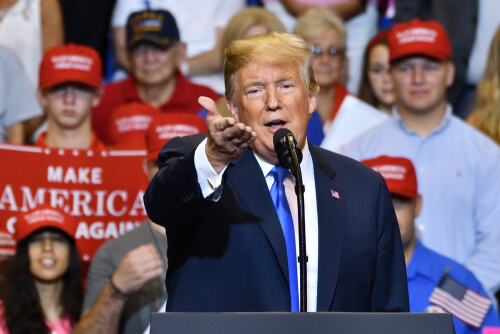There is a persistent belief that business people are what you need in the Oval Office. It was one of the credentials on Donald Trump’s resume.
That, too, may be one of the underlying weaknesses of Trump’s presidency.
When Trump was elected, he thought he was the new proprietor of the United States, as though he had bought it in a deal. He had paid his money and acquired a new company: Donald Trump, chairman, chief executive officer and majority stockholder.
Trump came to Washington to run his new company. He won, as he likes to say, and the United States was his with which to do what he liked, where his whim was law. Pull out of a treaty, abrogate an agreement, decide the moral acceptability of the sexual preferences of the staff, and fire, fire, fire.
Rupert Murdoch — Trump’s man Friday in the media — famously said he had the right to say what was published in his newspapers. He asserted a kind of divine right of the proprietor; a concept that was eroding as the concept of the newspaper as a public service was gaining ground. Murdoch was not interested in the public service approach. Neither is Trump. They sit next to each other in the pea pod of history.
Trump’s view of the presidency as a proprietorship, the wholly owned property of the CEO, is seen in his actions and even more in his frustrations. If he were sitting atop a giant corporation, his word would be law; he could hire and fire at will, dictate a course of action and maybe retract it. The boss gets what the boss wants, particularly if it is a privately held outfit, like the Trump real estate empire.
Clearly, Trump thought that was what he would do when he took over the United States. His attempts to govern by fiat illustrate that frustration.
Trump, who is not a reader, had not schooled himself in the realities of governance, the give and take of Washington, the grand negotiation that is democracy, imperfect but purposeful — the great purpose being the republic and its well-being.
The organizing principle of a business is profit: It must take in more money than it spends. In real estate you bet against rising demand, borrow and buy. That is not a guide as to how to run the United States, or any other country.
The assets and liabilities balance differently. For example, NATO is an asset and Russia a liability.
Statesmen want to project power rather than use it. Trump wants to use it, to have dominion over the whole government and allies. He wants Congress to act only as permissive board of directors, not an equal partner. If the deal fails, he wants to be able to walk away. In government, and especially in international relations, you cannot walk away. The deal is nonetheless your deal, your failure.
I have watched other business people come to Washington and make, on a smaller scale, the same mistakes. They failed to understand the system; that to get things done you bend the system, not break it.
These, the benders, are the consummate Washington hands, often with institutional memories. They are the ones who get things done.
There is another side to this coin, and that is that no knowledge of business is a detriment to a leader. Sen. George McGovern, D-South Dakota, after his unsuccessful bid to win the 1972 presidential election, lamented that he wished he had understood business better when he was candidate lashing out at big business.
Lashing out at business is a standard approach by today’s Democratic hopefuls. It does not sit well with a lot of voters, particularly as most are employed by business. Those who think that kicking posterior is all that is needed in Washington are as wrong as those who think that business needs a boot in the same place.
The C suite does not fit in the Oval Office but, conversely, politicians have often been ignorant of the disciplines of business. Some tension is constructive; too much, and the nation loses.

 Follow
Follow
Leave a Reply